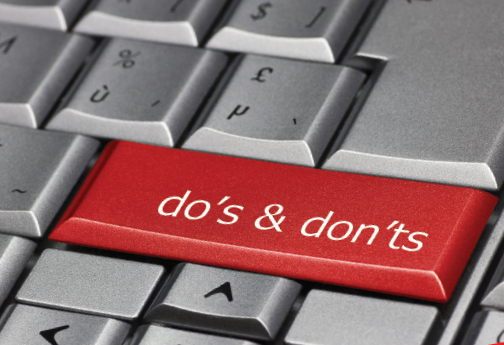Dos and Don’ts of Being a Good Digital Citizen
Being a good online citizen is about being responsible and smart and having respect for yourself and others. As a user of the Web, various apps, social networking sites, and other online collaboration forums, you are a citizen of different communities. And just like real-life communities, there are rules to follow that will make sure you have the best possible experience. See the list for digital dos and don’ts:
1. This sounds pretty basic, but it’s probably the one piece of digital etiquette advice that is broken the most. Keep your comments positive; be truthful and polite.
2. Not everything online is true. In fact, there’s a lot online that’s not true. Before believing (or sharing), dig deeper. Search for facts. Just because it’s written online doesn’t mean it’s true.
3. Whether you’re using classroom forums, Twitter, Facebook, or other sites, know the site’s rules and guidelines and follow them. Each community creates their own rules that they expect users to follow, which can usually be found in the Site Rules or About Us section.
4. It’s crucial not to share any personal information, passwords, addresses, etc. with someone you don’t know.
5. Online comment can be even more hurtful than a face-to-face insult because once something is written, the person can read it over and over again. Sometimes we find it easier to reply with negative comments when the person is not right in front of you, and you can hide behind your computer or smartphone. Don’t be tempted; think twice about what you are saying before you post or send, and ask yourself, ‘Would I say this to someone if they were standing in front of me?’
6. Before you say or post anything online, ask yourself, ‘Am I ok if this is never deleted?’ Once something is out there online, it is likely it’s out there for good. There is no delete button or eraser for the Internet.
7. If you saw something happen in real life where someone could be harmed, you’d call for help, right? If you see something online that may be harmful to someone else, report it to the site’s authorities or an adult you trust. With cyberbullying and online predators, we cannot be too careful these days, and we all need to look out for each other.
8. All content was created by someone, and that person owns their content. This includes articles (and any portion of articles), photos, memes, reports, blogs, and anything else online that wasn’t created by you. Be aware of copyright laws, ask permission before you share, and be sure to give credit if you reuse or repost an article or picture you didn’t create.
9. The Internet is an amazing place with lots to offer. As with all things that provide an outlet, moderation is important. Don’t forget that the real world, real people and real human interaction provide a lot of lessons and experiences, too.

